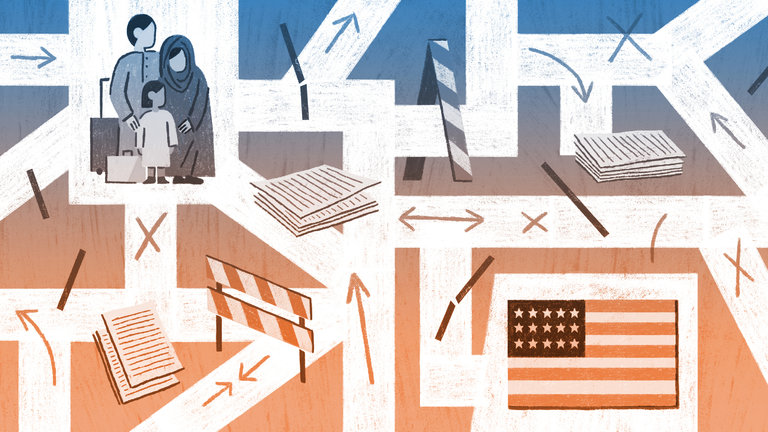Lost amid the uproar over the Trump administration's travel restrictions on citizens from Muslim-majority countries and the impending showdown at the Supreme Court are the insidious ways that the government has already begun to impose a Muslim ban.
It's doing so through deceptively boring means: increasing administrative hurdles and cementing or even expanding the current travel restrictions that are not under review at the court. The collective impact of these changes will be that a permanent Muslim ban is enshrined into American immigration policy.
Last month, the Supreme Court agreed to hear two cases that challenge the legality of President Trump's immigration and refugee executive order. And it buoyed the Trump administration's xenophobia when it put the temporary ban back in place and denied entry to people who lack a "bona fide relationship" with an American citizen or entity. (Astonishingly, the government claims that grandparents, aunts, uncles, cousins and the affianced lack such a relationship, but a federal judge in Hawaii has disagreed.)
While these short-term travel restrictions will be at the heart of what the Supreme Court considers this fall, they have never been the president's ultimate objective. Instead, his endgame, as he repeatedly made clear on the campaign trail, is the "total and complete shutdown of Muslims entering the United States." And in a quiet, under-the-radar manner, his administration has been hard at work to make that happen.
The State Department has already moved to implement the president's "extreme vetting" directive by imposing new, onerous visa application requirements. Several weeks ago, the agency invoked emergency reviewand approval procedures to push through these changes with minimal public comment or scrutiny. They force applicants to submit years' worth of personal data, including from social media accounts.
Of course, not all visa applicants are subject to this review; it's only for "populations warranting increased scrutiny." But everyone knows that term is code for people from predominantly Muslim countries. Even before these requirements were enacted, those people had to endure invasive questioning and prolonged processing times. The Trump administration has simply formalized this as official government policy.
With little fanfare, the administration has also walked back a commitment to speed up the time it takes to get a visa. At the end of June, President Trump rescinded an Obama-era executive order that had required the State Department to make sure that a vast majority of interviews for nonimmigrant visa applicants happen "within three weeks of receipt of application."
Every weekday, get thought-provoking commentary from Op-Ed columnists, the Times editorial board and contributing writers from around the world.
The White House has cited national security concerns for this change, but the impact, especially when combined with the other "extreme vetting" measures, will be even longer delays for applicants and greater backlogs.
Those aren't the only ways the government is stealthily implementing its Muslim ban. The Trump administration has also moved forward with parts of the president's order that the justices will not review this fall.
For example, the executive order tasks federal agencies, including the departments of state and homeland security, with reviewing visa screening processes, at home and abroad, to see if they're sufficiently rigorous. That information will be used to figure out whether or not the short-term travel ban should be extended indefinitely and whether countries should be added to or removed from the list of excluded nations. This creates an easy way to target disfavored countries.
Just last week, the agencies sent the White House a report detailing their initial recommendations. While the agencies have refused to make their findings public, all circumstantial evidence suggests that Muslim-majority countries will bear the brunt of these restrictions, which is exactly what President Trump has called for.
The Twitterverse and cable news pundits are unlikely to be mobilized by policy changes that come about through these types of bureaucratic processes. Most people are not closely following the intricacies of visa vetting and screening.
That's a shame because there is already evidence that they are working. The number of visas issued to citizens from Muslim-majority countries has decreased by double digits. Among nearly 50 Muslim-majority countries, nonimmigrant visas declined almost 20 percent in April, compared with the monthly average from 2016. Visas issued to people from Iran, Syria, Sudan, Somalia, Libya and Yemen, the six countries on the travel ban list, were down 55 percent. Those figures will continue to get worse if these other provisions are implemented.
Finally, consider an embarrassing incident. An Afghan girls' robotics team was initially denied entry into the United States to participate in a science competition. It was only after public outcry and an intervention by President Trump that they were granted passage. Situations like that are also likely to have a chilling effect on people from Muslim-majority countries, resulting in further decreases.
A Muslim ban, even when implemented through seemingly mundane bureaucratic processes, simply has no place in our country.
LINK: https://www.ansarpress.com/english/7625
TAGS:





















 World through the aperture
World through the aperture




